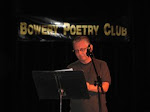As snow pours down into New York, thousands of people remain without power--to say nothing of those who have lost their homes altogether. (The fate of more than one of my co-workers.) So it seems almost criminal to pull down this uber-celebratory disc of polycarbonate plastic to rip for you all this evening. But, then, we do have something to celebrate tonight: The United States seems to be on the verge of slowly--key words "verge" and "slowly"--shifting a bit to the left.
Legalized marijuana in Colorado and Washington. Same-sex marriage in Maryland and Maine and probably Washington? (I've sort of lost track of that.) Tammy Baldwin elected as first openly gay senator in Wisconsin. More women in the house of reps now than ever before. That whole Todd Akin thing shut down by Claire McCaskill in Mizz freakin' Zouri while in Indiana, God's Will intending for Richard Mourdock's political career to get fucked. Finally, President Obama reelected, despite having pissed off just about as many liberals over the last four years as he has conservatives.
Yes, I know that close to half of the voting population voted for that other guy. And that celebrating your gay marriage by getting stoned is not legal in most states--or federally, for that matter. And that Michele Bachmann, a woman who believes that slavery was eradicated by our founding fathers, that getting vaccinated for HPV leads to mental retardation, and that the Muslim Brotherhood has infiltrated the U.S. government, actually held her house seat in Minnesota. (Having lived in Minneapolis-St. Paul for six years in the 1990s, I am extremely disappointed with my former state mates.)
But, still. As even conservative poll aggregation enthusiast Dick "I Goofed!" Morris seems to be realizing, the United States is a multi-culture, not a mono-culture. And we sort of showed that, kinda sorta, via last night's elections.
So, in celebration: Could there be anything more life-affirming, more get-you-up-off-your-ass-and-dancin', than Hakim? I found this best-of album at the Nile Deli on Steinway Street a couple of days after Sandy had passed and picked it up to lift my spirits. A few days after that, I offer it to you, for yours.
















%20-21%2025.jpg)




































































.jpg)






























